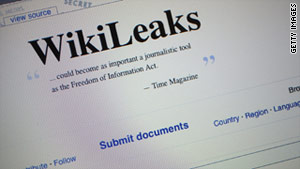 The US has strongly criticised the release by the website Wikileaks of thousands of extracts from US diplomatic messages.
The US has strongly criticised the release by the website Wikileaks of thousands of extracts from US diplomatic messages.
Among the revelations is a report Saudi Arabia's King Abdullah urged the US to destroy Iran's nuclear facilities.
The founder of Wikileaks, Julian Assange, said the US authorities were afraid of being held to account.
But the White House said the release was "reckless" and put the lives of diplomats and others at risk.
One Republican congressman called for Wikileaks to be designated a terrorist organisation.
Peter King, a member of the House of Representatives Homeland Security Committee, said the latest release "manifests Mr Assange's purposeful intent to damage not only our national interests in fighting the war on terror, but also undermines the very safety of coalition forces in Iraq and Afghanistan".
Meanwhile, Pakistan's foreign ministry condemned what it called "the irresponsible disclosure of sensitive official documents".
The US Department of Defence says it is making its computer systems more secure to prevent future leaks.
Computer hacking
Wikileaks has only posted some 200 of the 251,287 messages it says it has obtained. However, the entire bundle of cables has been made available to five publications, including the New York Times and the UK's Guardian newspaper.
The leaked cables by US diplomats posted overseas contain blunt appraisals of their host governments, and unflattering pen portraits of world leaders.
US officials are said to have described Italian Prime Minister Silvio Berlusconi as feckless, vain and ineffective, sharing a close relationship with "alpha dog" Russian Prime Minister Vladimir Putin.
President Nicolas Sarkozy of France is said to be thin-skinned and authoritarian, while German Chancellor Angela Merkel is described as risk-averse.
Afghan President Hamid Karzai is referred to as "extremely weak" and susceptible to conspiracy theories.
Meanwhile, Colonel Muammar Gaddafi of Libya always travels with a "voluptuous blonde" Ukrainian nurse, according to one of the cables.
Concerns aired include the security of Pakistani nuclear material that could be used to make an atomic weapon, while the widespread use of computer hacking by China's government is also reported.
Other issues covered in the cables are:
Iranian attempts to adapt North Korean rockets for use as long-range missiles
Corruption in Afghanistan with concerns heightened when a senior official was found to be carrying more than $52m (£33m) in cash on a foreign trip
Bargaining to empty the Guantanamo Bay prison camp - including Slovenian diplomats being told to take in a freed prisoner to secure a meeting with President Barack Obama
Germany being warned in 2007 not to enforce arrest warrants for CIA officers involved in an operation in which an innocent German citizen with the same name as a suspected militant was abducted and held in Afghanistan
US officials being instructed to spy on the UN leadership by Secretary of State Hillary Clinton
Alleged links between the Russian government and organised crime
Yemen's president talking to General David Petraeus (while he was responsible for US military operations in Central Asia and the Middle East as head of US Central Command) about attacks on Yemeni al-Qaeda bases and saying: "We'll continue saying the bombs are ours, not yours"
Faltering US attempts to prevent Syria from supplying arms to Hezbollah in Lebanon
Shedding light on wars?
The leaked embassy cables are both contemporary and historical, and include a 1989 note from a US diplomat in Panama City musing about the options open to Panamanian leader Manuel Noriega and referring to him as "a master of survival" - the author apparently had no idea that US forces would invade a week later and arrest Noriega.
In a statement, the White House said: "Such disclosures put at risk our diplomats, intelligence professionals, and people around the world who come to the United States for assistance in promoting democracy and open government.
"President Obama supports responsible, accountable, and open government at home and around the world, but this reckless and dangerous action runs counter to that goal."
No-one has been charged with passing the diplomatic files to the website but suspicion has fallen on US Army private Bradley Manning, an intelligence analyst arrested in Iraq in June and charged over an earlier leak of classified US documents to Mr Assange's organisation.
The cables release was the third mass Wikileaks release of classified documents since it published 77,000 secret US files on the Afghan conflict in July, and 400,000 documents about the Iraq war in October.
Wikileaks argues the release of the documents has shed light on the wars, including allegations of torture and reports that suggest 15,000 additional civilian deaths in Iraq.



